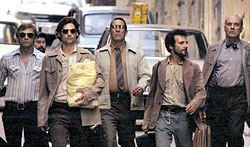 These days it is difficult to watch movies without seeing parallels to Nepal. Sitting in the velvet seat and the womblike darkness of a cinema and being transported to an escapist onscreen world, the brain suddenly switches to the reality of a home faraway. And a haunting worry nags the soul.
These days it is difficult to watch movies without seeing parallels to Nepal. Sitting in the velvet seat and the womblike darkness of a cinema and being transported to an escapist onscreen world, the brain suddenly switches to the reality of a home faraway. And a haunting worry nags the soul.
So it is whether watching Motorcycle Diaries, Syriana or Munich the thoughts automatically turn to the conflict in my own country. My friends are in tears as we watch Munich but I wasn't moved as much by Steven Spielberg's strong emotional effects as I was forced to think about the violence in Nepal-especially the role that revenge plays in starting and prolonging conflict.
I remembered watching the poignant documentary Killing Terraces by Dhruba Basnet in which a yoiung boy from Rukum is interviewed. With an intensity that belies his age and young face he speaks into the camera, vowing to "drink the blood of my parent's killers". His hatred-filled voice, soft yet determined, haunted me for days after watching the documentary.
It made me wonder how many thousands of Nepalis there must be who have witnessed the torture and death of near and dear ones by both sides and how the poison of revenge will stay for generations to come and how difficult that will make reconciliation. More than anything else it is the vengeful wounds of war that will perpetuate violence.
Munich makes a point about the vicious circle of unending revenge. The team starts with the killing of those responsible for the ssassination of 11 Israeli sportsmen in Munich Olympic Stadium in 1972 . What follows is the murder of one suspect after another in different parts of Europe. By the end of the film, there is only the team leader remaining who is haunted by his past and fears the safety of his family from those whose lives he set out to take. The film projects the psychological effect of the killing on team leader Avner even if the cause is to avenge his nation. The message is that killing is not the answer.
Agreed. But tell that to those whose friends and relatives died in Pili, Nagarkot or Tansen. They may be civilians or combatants but every death plants the seeds of hatred among ten other Nepalis. What was political then becomes private, a revolution is transformed into revenge and violence itself becomes self-perpetuating as it devours more innocents along the way.
Ten years after the Maoists started their war, the original 42-points are all but forgotten. Was it worth so many deaths and so much vengeance?
Issues of revenge was always lurking behind the political agenda of the left: inequality fuelled by understandable anger against feudal exploitation was channelled into the justification of armed struggle. But the violence bred more violence and now threatens to sweep us all away.
Did those who lynched teachers in front their families and students think about the hate they were planting in the minds of those who witnessed the murder? Did those who abducted and tortured students and teachers think of how the brutality would affect the victims? Was that worth it, however righteous the cause? After ten years, the cause is now obliterated by the need to get even-and now it is just violence for the sake of violence.
Gandhi knew this and that is why he preached ahimsa, a beautiful word that goes beyond just non-violence. Don't get into the killing game, he warned, or it will come back to you magnified tenfold.
As we walk out of the theatre, I am convinced Nepal will come out of its present trauma because a solution has always been within reach. But only if we mark the anniversary this week by stopping this mad cycle of cruelty that multiplies cruelty.
Deepa Rai recently completed her MA in journalism from Cardiff University in Wales.



